This blog seeks to spotlight noteworthy UNESCO science and communications programs; it emphasizes links between the United States and UNESCO.
Friday, December 29, 2006
UNESCO Young Professionals Program
Young professionals (who will be under the age of 30 on May 1, 2008) should keep this program in mind, and consider applying next Fall when we expect the process will open again.
Wednesday, December 27, 2006
Tuesday, December 26, 2006
Global Forum: Building Science, Technology, and Innovation Capacity for Sustainable Growth and Poverty Reduction
 On February 13-15, 2007, the World Bank, in partnership with UNESCO, UNCTAD, the IDB, DFID, CIDA, and the GRA, will convene a Global Forum on Building Science, Technology, and Innovation Capacity for Sustainable Growth and Poverty Reduction. The Forum will seek to understand the lessons of previous and ongoing STI capacity building experiences and map out new and more effective ways for governments, industry, academia, foundations, and donors to work together to apply STI capacity building to development in low and middle-income countries.
On February 13-15, 2007, the World Bank, in partnership with UNESCO, UNCTAD, the IDB, DFID, CIDA, and the GRA, will convene a Global Forum on Building Science, Technology, and Innovation Capacity for Sustainable Growth and Poverty Reduction. The Forum will seek to understand the lessons of previous and ongoing STI capacity building experiences and map out new and more effective ways for governments, industry, academia, foundations, and donors to work together to apply STI capacity building to development in low and middle-income countries.A background paper is available at this website.
"Science in an International and Humanitarian Context"

Read the full article by Lynn Dicks on the AAAS Science Careers website (22 December 2006).
I quote extensively from the article:
Natarajan Ishwaran, director of the UNESCO Ecology and Earth Sciences division, says that the first UNESCO director-general, the distinguished zoologist Julian Huxley, fought hard to put science on UNESCO's agenda. Today, UNESCO spends one-seventh of its $610 million budget on science and employs about 200 scientists. About half of them are based at the Paris headquarters; the rest work in one of five regional and 51 field offices around the world. The job of these scientists is to co-ordinate international efforts between researchers and the public, the media, and international governments. "We are brokers," says Ishwaran, "between science and everything else."A climate scientist at UNESCO
UNESCO is keen to recruit young scientists, and those hoping to swap research for a career in intergovernmental work will find some opportunities there--provided they are not looking for too much job security.
UNESCO offers different entry points (see box) to people who are already involved in international research and can contribute their own ideas and contacts. Because these jobs are truly international, one of the most important credentials is the ability to speak several of the six United Nations languages. With 200 to 500 applicants for every job, competition is comparable to what it is for good faculty science jobs--which isn't surprising considering the tax-free pay, 30 days of annual leave, expenses to travel home, and for dependent children extra pay and educational grants all the way through university. The nature of the work is attractive too. "Intergovernmental work is seductive to young scientists," says Patricio Bernal, an assistant director-general at UNESCO, because it has the potential to change things for the better, on a global scale.
Albert Fischer, a Swiss-American oceanographer who speaks French and English and is learning Spanish, has been working for 2 years at the UNESCO Intergovernmental Oceanographic Commission (IOC) in Paris, where he co-ordinates a group of academic scientists charged with deploying a global ocean-observation system to help predict the climate. Fischer recently presented work to a meeting of the U.N. Framework Convention on Climate Change. "It was very exciting," says Fischer. "I was out of my realm. Here in Paris, I work alongside other oceanographers. There, I was presenting to ministers of state."Young scientists from the United States should contact the State Department's UNESCO office for help in getting a job with UNESCO. Let us know at Americans for UNESCO if we can help!
Call for a binding intergovernmental agreement for an ocean observation system
Today the Director-General of UNESCO, Koïchiro Matsuura, announced a new partnership between UNESCO’s Intergovernmental Oceanographic Commission (IOC), which has coordinated the planning and implementation of this system, and the global satellite communications leader, INMARSAT, provides free satellite communication links to 50 sea-level sensors in the Indian Ocean, making this part of the tsunami warning system the most advanced real-time sea-level network in the world.
In making the announcement he remarked:
UNESCO’s IOC is committed to helping all countries in the world’s danger zones to building their national warning systems as part of the global tsunami and other ocean-related hazards warning system, right down to the last mile. I am pleased to report that real progress has been achieved in the Indian Ocean and work is well underway on warning systems for the North Eastern Atlantic and Mediterranean Region and the Caribbean, and the upgrading of the system in the Pacific. It must continue.
I am convinced that the data concerned must be considered as a Global Public Good. I therefore believe that its free and open exchange needs be upgraded to the level of a universal binding intergovernmental agreement, in order to commit nations to sustaining an integrated ocean observing system. Only when such an instrument exists will there be any guarantee that the extraordinary technology being deployed and the vast human and financial resources being mobilized will fulfill the promise that we, the international community, have made to better protect peoples’ lives and well being from such catastrophes as the tsunami that shook the world two years ago.
Monday, December 25, 2006
UNESCO's Content Development Program
 UNESCO is helping to overcome the language barriers to access information in cyberspace faced by many in poor countries. For example, it is training professionals and policy-makers in this field.
UNESCO is helping to overcome the language barriers to access information in cyberspace faced by many in poor countries. For example, it is training professionals and policy-makers in this field.UNESCO continues its support for the production, dissemination and preservation of culturally diverse content. Action is targeting public service broadcasters and ICT-based content producers to enable them to produce and disseminate programs reflecting local views on major societal issues. The Program for Creative Content, launched in 2002, has been instrumental in pursuing these objectives. The strategy includes building capacities among media professionals to create content in unreported and under-reported areas, with special emphasis on MDG.
Particular attention will be given to the role of the media in promoting dialog among cultures and civilizations as well as peoples.
Saturday, December 23, 2006
UN Educational, Scientific, and Cultural Organization (UNESCO)
The UN Educational, Scientific, and Cultural Organization (UNESCO) was established in 1945 with the primary objective of contributing to peace and security worldwide by promoting global collaboration through education, science, and culture. Since rejoining UNESCO on October 1, 2003, the United States continues to promote U.S. priorities at UNESCO in each of the Organization’s five sectors: Education, Culture, Communication and Information, Natural Sciences, and Social and Human Sciences. By promoting collaboration among nations, UNESCO strives to further universal respect for justice, the rule of law, human rights, and fundamental freedoms. Priority programs foster and defend the free flow of ideas and open access to education for all; build understanding of democratic principles and practice; promote scientific knowledge; and protect the cultural and natural heritage of humankind. UNESCO, which is headquartered in Paris, has 191 member states and has been led since 1999 by Director-General Koichiro Matsuura (Japan). He was reappointed for a four-year term in October 2005.
The Executive Board, one of UNESCO’s three constitutional bodies, consists of 58 member states with four-year terms of office. It examines the program of work and corresponding budget proposals, and ensures the effective and rational execution of the program by the Director-General. As a member of the Board, with a term that expires in 2008, the United States participated in the semiannual Board Sessions in Paris in April and September 2005. The Board continued negotiations on two instruments, the Convention on the Protection and Promotion of the Diversity of Cultural Expressions and the Declaration on Bioethics and Human Rights. The United States engaged actively in negotiating both of these instruments. In September, the Executive Board recommended that the General Conference, which met in October, consider the Convention on the Protection and Promotion of the Diversity of Cultural Expressions and the Declaration on Bioethics and Human Rights.
The Executive Board examined the Director-General’s preliminary proposals concerning UNESCO’s Program and Budget for 2008–2009. The Board also recommended that the Director-General temporarily stop creating normative instruments, put more effort into implementing education for all, and implement a review of the Natural and Social and Human Science programs.
U.S. priorities at the Executive Board were to maintain budget discipline within UNESCO and focus UNESCO program efforts and budget resources on the areas of literacy, capacity building in science and engineering, and the preservation of cultural objects. In particular, the United States was pleased with UNESCO efforts in the area of education.
In 2005, UNESCO saw several successes in the area of education, a main priority for the United States. The United States worked with other member states to promote results-based education programs at the country level, where they will do the most good toward achieving the goals of education for all. The United States also worked closely with UNESCO in launching the Literacy Initiative for Empowerment, a literacy strategic framework with the goal of achieving concrete, measurable results in 34 countries with the highest rates of illiteracy. U.S. literacy experts were included in the preparation of this strategy, as a way to help ensure that U.S. research and experience in this critical area could be shared with others, including the promotion of an inter-generational, mother/child approach to literacy programming.
At the General Conference in October, the United States was able to join consensus on the Declaration on Bioethics and Human Rights by heading off an intense effort to include a number of subjects that were inappropriate for the declaration. The United States, however, voted against the Convention on the Protection and Promotion of the Diversity of Cultural Expressions after it became clear that the Convention was going to be used to implement trade protections for “cultural expressions.” Negotiations on the Convention, which was heavily promoted by France and Canada, were set in motion by the adoption of a related Declaration before the U.S. reentry to UNESCO in 2003. In addition to concerns about the Convention’s potential effect on trade, the United States also expressed concerns about the impact of the Convention on the free flow of information. The vote on adoption of the Convention was 148 to two (U.S. and Israel), with four abstentions. Thirty countries must deposit their instruments of ratification with UNESCO for it to enter into force.
The UNESCO regular budget for 2005 was approximately $305 million; the U.S. assessment was $76.7 million. Since 1986, the United States has also regularly made voluntary contributions to UNESCO. The 2005 contribution totaled $837,000 and was used to support UNESCO-related international educational, scientific, cultural, and communications activities considered to be in the U.S. national interest. In 2005, of the 732 positions subject to geographic distribution, Americans held 30 posts, or 4.1 percent.
Tuesday, December 19, 2006
U. S. Support for Multinational Organizations
The United States is a leader in international development cooperation because of the large size of its economy, its ability to influence global action and its presence within the international donor community. It is the largest donor in the Development Assistance Committee (DAC) with a record high net official development assistance (ODA) of USD 27.6 billion in 2005.
As a share of Gross National Income, this ODA represented 0.22%. While this was its highest level since 1986, the US ranks second to last within the DAC for this statistic. The bulk of this growth is explained by Iraq debt forgiveness and reconstruction; reconstruction and anti narcotics efforts in Afghanistan; and specific programs in Africa, primarily Sudan and Ethiopia. Given the substantial debt relief granted for 2004-05, aid volumes may be lower in the future, although an annual level over USD 20 billion is probable.U.S foreign assistance funding is fragmented among government institutions. USAID was responsible for 38.8% of total ODA in 2005 (down from 50.2% in 2002). A primary factor in this decline was the rapid increase in ODA disbursements managed by the Department of Defense (21.7% in 2005 versus 5.6% in 2002).
While the volume of (U.S. support for) multilateral ODA has fluctuated over time, its share of gross ODA has experienced a decline from almost 26% in 2002 to 8% in 2005. This figure is among the lowest of DAC member nations. Thus not only does the United States provide less official development assistance as a portion of GDP than virtually any other developed nation, it provides a smaller portion of that assistance via multilateral organizations such as UNESCO.
Monday, December 18, 2006
UNESCO source book for science teaching, 2006
That in turn was followed by “The New UNESCO Sourcebook for Science Teaching,” printed in 1973 and reprinted until 1979, One can still find copies of the New Sourcebook for sale used on the Internet. The New Sourcebook was written by a team of American science educators. According to John Elfick, these books "revolutionized secondary school science teaching because they brought concepts normally left until tertiary education to secondary schools through simple experiments."
Elfick worked in UNESCO from 1990 to 1999, both in the Science Education section in Paris and in UNESCO Beijing. He describes himself has having become "obsessed with the idea of revising the UNESCO Sourcebook" and did so in Beijing in the Chinese language, assisted by the science staff at Capital Normal University. When he returned to the School of Education, University of Queensland, Australia, he started putting the English version on the internet. Click here to see that version.
It has since received almost 150,000 hits, over 40% from North America. Now UNESCO has given John Elfick a contact to produce the book version, and you can see his progress on the website.
Thanks to Bob Maybury for alerting us to the history of this important effort.
The United States Mission to UNESCO
http://www.unesco.usmission.gov/
Saturday, December 16, 2006
Environmental Ethics and International Policy

What is the moral value of the environment? What in nature is worth protecting, preserving or respecting? What do we mean by global sustainability? How much should we care for the interests of future generations? What are the implications of the principle of justice for policy decisions related to environmental issues?In this new publication from UNESCO, eight experts in environmental ethics from around the world, advising the World Commission on the Ethics of Scientific Knowledge and Technology, address key ethical issues at stake in environmental sciences and policies. The studies presented analyze the state of the art in the relatively new area of environmental ethics. They also develop approaches to determining how international policy can promote ethical reflection about the environment.
The book is available from UNESCO publications for 22,00 €.
Monday, December 11, 2006
Kofi Annan at the Truman Library
 You Americans did so much, in the last century, to build an effective multilateral system, with the United Nations at its heart. Do you need it less today, and does it need you less, than 60 years ago?
You Americans did so much, in the last century, to build an effective multilateral system, with the United Nations at its heart. Do you need it less today, and does it need you less, than 60 years ago?Surely not. More than ever today Americans, like the rest of humanity, need a functioning global system through which the world's peoples can face global challenges together. And in order to function, the system still cries out for far-sighted American leadership, in the Truman tradition.
Wednesday, December 06, 2006
UNESCO Organizes First Infoethics Conference for Latin America and the Caribbean
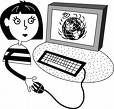 Experts from some ten countries will discuss ethical dimensions of the information society this week in Santo Domingo, the capital of the Dominican Republic, in a Regional Conference that is organized by UNESCO and the Fundacion Global Democracia y Desarrollo (FUNGLODE).
Experts from some ten countries will discuss ethical dimensions of the information society this week in Santo Domingo, the capital of the Dominican Republic, in a Regional Conference that is organized by UNESCO and the Fundacion Global Democracia y Desarrollo (FUNGLODE).
The participants in the Conference will also discuss a draft of a Code of Ethics prepared by UNESCO in cooperation with international experts. A Declaration on Infoethics in Cyberspace is also planned to be adopted by the participants.
“In Santo Domingo, we provide to information producers, managers, users and service providers a platform for discussing the definition of best practices and voluntary, self-regulatory, professional and ethical guidelines that UNESCO believes are essential in face of increasing globalization”, says UNESCO’s Boyan Radoykov.Since 1997, UNESCO initiated a series of events enabling specialists and decision-makers to address the ethical dimensions of the Information Society.
Related
UNESCO Communication and Information Portal, Ethical Issues of Information Society
Logo ©InfoEthics 2004 Roundtable
Tuesday, December 05, 2006
2007: 'Year of Science' in Africa?
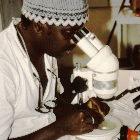 The following is excerpted from an article written by Wagdy Sawahel and posted on SciDev.Net. Please click here to access full article.
The following is excerpted from an article written by Wagdy Sawahel and posted on SciDev.Net. Please click here to access full article.
African science ministers who met last week in Cairo, Egypt, have recommended a set of measures to promote science and technology across the continent for endorsement at next month's African Union (AU) summit of heads of states. The ministers will ask the summit to create a Pan-African Intellectual Property Organization, and to designate 2007 as a year for science, technology and innovation in Africa.
The heads of state will be asked to agree that at least 1 per cent of countries' gross domestic product should go to promote research and development and to develop innovation strategies for economic growth. The ministers will also ask the AU summit to express support for South-South cooperation in science, technology and innovation, and to enhance the role of such cooperation in international partnerships.
A plan to create a 20-year biotechnology strategy was among many ideas that the ministers pledged to commit themselves to collectively. This strategy will involve harmonizing national and regional regulations that promote the application and safe use of biotechnology.
The proposal to nominate 2007 as a year of science, technology and innovation provoked lively discussion at the conference. Some ministers hesitated over launching such a year so soon, without clarifying what activities and programs it would entail, but there was an eventual agreement to call 2007 the 'launching year' for building up science and technology in Africa.
The ministers pledged to create common guidelines for identifying and creating African networks of centers of excellence in science and technology. They also vowed to better consult with local scientists, including science academies in Africa and African scientists in the diaspora. This comes partly as a response to recent criticism from the scientific community that it felt excluded from policy decisions (see African academies urge politicians not to ignore them).
Their final recommendations, named the 'Cairo declaration', will be presented to the AU Summit in Addis Ababa, Ethiopia next January, which will focus on 'Science, Technology and Research for Africa's Development'.
Organized by the AU Commission on behalf of the African Ministerial Council on Science and Technology (AMCOST), the conference was attended by representatives from 26 AU member states and agencies, international and continental government and nongovernmental organizations, and the diaspora.
Photo ©SABC News
Friday, December 01, 2006
International Round Table: Women and Research: Tangible Progress?
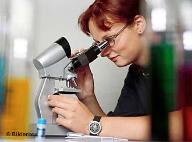 Within the framework of the Second International Colloquium on Research and Higher Education Policy, today’s Round Table at UNESCO Paris Headquarters will address the issue of women’s involvement in higher education, particularly in research, and their advancement in this sphere. It will emphasize the progress made by women in the area of research and its impact on women’s empowerment, the challenges faced by women in their research career and the lessons learnt regarding factors that foster an enabling environment for women’s participation in research.
Within the framework of the Second International Colloquium on Research and Higher Education Policy, today’s Round Table at UNESCO Paris Headquarters will address the issue of women’s involvement in higher education, particularly in research, and their advancement in this sphere. It will emphasize the progress made by women in the area of research and its impact on women’s empowerment, the challenges faced by women in their research career and the lessons learnt regarding factors that foster an enabling environment for women’s participation in research.The participants to the Round Table are established researchers and leaders in their fields of expertise. They will reflect on these issues from a personal and institutional perspective.
Photo ©Bilderbox
UNESCO and HP Launch Grid Computing Project To Counter Brain Drain In Africa
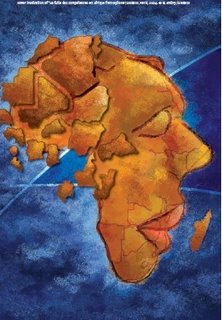 African scientists will be able to connect up with fellow researchers who have moved overseas through a 'grid computing' project. Grid computing technology uses powerful computer servers to give individuals access to databases all over the world.
African scientists will be able to connect up with fellow researchers who have moved overseas through a 'grid computing' project. Grid computing technology uses powerful computer servers to give individuals access to databases all over the world.The UNESCO Hewlett-Packard “Piloting Solutions for Reversing Brain Drain into Brain Gain for Africa” project was launched on November 20th to help reduce brain drain in Africa by providing universities laboratories and research centers in Algeria, Ghana, Nigeria, Senegal and Zimbabwe with systems of interconnections that will enable students and faculty who have stayed in their countries to establish links with researchers and professionals around the world.
The African project was developed by UNESCO’s Education Sector in response to requests by Member States. Over the past decades, African countries have suffered greatly from the emigration of skilled professionals, scientists, academics and researchers who are estimated to be leaving the continent at the rate of 20,000 a year.
The Education Ministries of the countries involved, along with UNESCO, will choose the universities that will benefit from the project. Preference will be given to university departments with important information technology components. HP will provide equipment and local human resources to the universities, as well as training and support, until the projects become self-sustainable. It will also donate PCs and monitors and fund research visits abroad and meetings between beneficiary universities.
UNESCO will be in charge of overall coordination and monitoring of activities, as well as administrative management; evaluation and promotion of results.
This new project in Africa follows the successful joint HP-UNESCO “Piloting Solutions for Alleviating Brain Drain in South East Europe” project, launched in 2003. Three years after its launch, the project has resulted in the development of websites, databases and new research projects at several of the universities involved. Four universities* have become self-sustainable in the use of grid technology and the project continues in three other universities**.
*University of Split in Croatia, University of Montenegro, East Sarajevo University and the University of Sarajevo
**University of Belgrade, University of Skopje and the University of Tirana
Related
Check out the October 2006 issue of UNESCO’s “Education Today” Newsletter: From brain drain to brain gain (PDF)
UNESCO and the private sector
African students the most mobile in the world, From the UNESCO Institute for Statistics
Hewlett-Packard and UNESCO, A partnership that works
UNESCO and US Library of Congress Host Meeting on World Digital Library Project
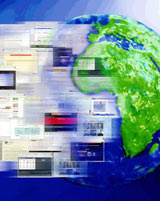
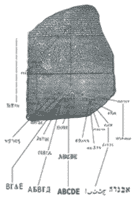
UNESCO and the Library of Congress will host today at UNESCO Paris Headquarters a meeting to pave the way for the launch of a World Digital Library, an internet-based repository of knowledge from all cultures and in all languages. The meeting will seek to establish a network of experts and partners who will work on the project. It is hosted by UNESCO Assistant Director-General for Communication and Information Abdul Waheed Khan, U.S. Ambassador to UNESCO Louise Oliver, and Librarian of Congress James H. Billington, who first proposed the idea for a World Digital Library in 2005. It will be chaired by Claudia Lux, President-elect of the International Federation of Library Associations and Institutions (IFLA).
“Making all this available free of charge on the Internet will give teachers and librarians a new resource to encourage young people to reads and study foreign languages, and will advance learning both with and between countries”, said Laura Bush, First Lady of the United States of America, and Honorary Ambassador for the UN Literacy Decade, in a message to the meeting.
“I am pleased UNESCO, the United States and other partners continue moving forward on this important initiative,” said UNESCO Director-General Koïchiro Matsuura. “We must encourage all Member States to pool efforts at all levels to protect unique and endangered books, manuscripts, archival documents and audio-visual materials through the use of state-of-the art technologies,” added Mr Matsuura.A key aspect of the project is to build digital library capabilities in the developing world, so that all countries and parts of the world can participate and be represented in the World Digital Library.
“For UNESCO, libraries – be they paper-based or digital – have always played a crucial role to fulfill its mandate to promote the free flow of ideas by word and image and to maintain, increase and spread knowledge”, said Abdul Waheed Khan announcing UNESCO’s support to the initiative.Related links
*Proposal for a World Digital Library. James H. Billington. The Librarian of Congress. Remarks to the Plenary Session. The U.S. National Commission for UNESCO. Georgetown University. 6 June 2005
* U.S. Mission to UNESCO
* UNESCO Supports Libraries
* World Digital Library Initiative Factsheet
* Should UNESCO Promote the Development of a World Digital Library?
* World Digital Library Planned: Library of Congress Envisions Collection to Bridge Cultures
Sunday, November 26, 2006
November 30th: Registration Deadline for Mondialogo Engineering Award
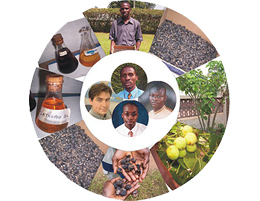 Registration for this award is open to project teams whose members are enrolled as students at universities, technical colleges, etc. Each team should consist of two student groups from developing and developed countries. Between December and May, the team should put together a practical, high-quality engineering project for the benefit of communities in developing countries. The team project should address the UN Millennium Development Goals of extreme poverty reduction and sustainable development. Submit your final project proposal to the Mondialogo team by 31 May 2007.
Registration for this award is open to project teams whose members are enrolled as students at universities, technical colleges, etc. Each team should consist of two student groups from developing and developed countries. Between December and May, the team should put together a practical, high-quality engineering project for the benefit of communities in developing countries. The team project should address the UN Millennium Development Goals of extreme poverty reduction and sustainable development. Submit your final project proposal to the Mondialogo team by 31 May 2007. Ten Mondialogo Engineering Awards of €20,000 each will go to the teams with the top project proposals. An Honourable Mention and €5,000 have been earmarked for 20 more teams. This is the second edition of the Mondialogo Engineering Award, a partnership between UNESCO and DaimlerChrysler. Access the registration form, the UNESCO focal point and the background.
See our previous related postings:
*Call for Applications: The Mondialogo Engineering Award
* 7 Teams Among U.S. Universities Were Among Winners of International Engineering Contest for 2005
Collage ©Peter Larbi
The 21st Century Dialogues
 “Are there limits to growth? Population, resources, energy, development?”
“Are there limits to growth? Population, resources, energy, development?” “Water for all?”
“Biodiversity in danger”
“Saving the planet: consume less to live better?”
“A new ethic of responsibility: towards a natural contract?”
These were the subjects addressed by leading scientists, experts, philosophers and policy-makers from around the world who examined the future of the human species and the prospects of our planet at the 21st Century Dialogues session organized by UNESCO’s Office of Foresight in Paris on November 25th.
Wednesday, November 22, 2006
UNESCO Contributes to Africa's Science and Technology Consolidated Plan of Action
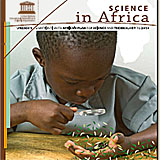 On 23-24 November, African Ministers of Science and Technology will be meeting in Cairo, Egypt to prepare the forthcoming summit of the African Union in Addis Ababa in January 2007.
On 23-24 November, African Ministers of Science and Technology will be meeting in Cairo, Egypt to prepare the forthcoming summit of the African Union in Addis Ababa in January 2007.
The African Ministerial Council on Science and Technology (AMCOST) was established in November 2003 under the auspices of the New Partnership for Africa’s Development (NEPAD) and the African Union. It is a high-level platform for developing policies and setting priorities on science, technology and innovation for African development. AMCOST provides political and policy leadership for the implementation of Africa’s Science and Technology Consolidated Plan of Action.
The theme of the upcoming Summit of the African Union in 2007 is science, technology and research for Africa's socio-economic development. This choice undoubtedly reflects the growing realization that science, technology and innovation are central to economic prosperity and to reaching the international development goals in such areas as food security, disease control, access to clean water and environmental sustainability.
In preparation for this event, UNESCO has put together a brochure on its contribution to Africa’s Plan for Science and Technology to 2010. Click here to read the Science in Africa brochure, and find out about the ways in which UNESCO can lend its support to NEPAD.
Elaborated in 2005 by the African Union and its NEPAD, Africa's Science and Technology Consolidated Plan of Action is the fruit of a continent-wide consultation; it creates a roadmap for international and regional cooperation in science and technology over the next five years.
UNESCO has accompanied this exciting new initiative, first by assisting in the initial elaboration of Africa's strategy for science and technology, then by co-organizing the First African Ministerial Conference on Science and Technology in Nairobi in 2003 and throwing its support behind the Second Ministerial Conference on the same theme in 2005. To ensure a coherent approach among United Nations agencies, UNESCO also held a meeting in June 2006 to prepare with its sister agencies for the African Union Summit in 2007.
Tuesday, November 21, 2006
On the US-Africa Materials Institute (USAMI)
The USAMI is a virtual institute that was crated in 2003 with sponsorship from the Division of Materials Research of the National Science Foundation.
- Sponsoring research visits by African Scientists to U.S. Universities to engage in USAMI-sponsored research.
- Sponsoring the visits to Africa for U.S. researchers and students to engage in research and education activities.
- Organizing workshops to bring materials scientists and engineers together.
- Using virtual tools to promote education activities at all levels of U.S. Africa Materials research.
USAMI scientists have access to well equipped labs for doing work in cutting-edge areas such as nanomaterials and biomaterials. There are also labs for micro-testing, mechanical/tribological testing, materials characterization (IAC Labs) and micro-/nano-fabrication (PRISM clean room) and workstations for computational simulations/experiments. These facilities are available to USAMI fellows and students along with the resources at more participating universities in the U.S.*
The research themes focus on two broad areas: Advanced Materials and Structures, and Materials for Societal Development.
In the area of biomaterials science, ongoing efforts include studies of multi-scale cell/surface interactions, and integrated efforts to develop BioMEMS and conjugated nanoparticles for disease detection and treatment. So far BioMEMS and conjugated nanoparticles have been developed for the detection and treatment of cancer. However, initial efforts are being made to extend these to other diseases such as FIV/HIV.
*Brown University, Columbia University, Harvard University, Howard University, Iowa State University, Lehigh University, Ohio State University, Rutgers University, University of Michigan, University of Tennessee, Yale University
© USAMI/Princeton University
Sunday, November 19, 2006
Join the UNESCO/OECD Internet Discussion Forum on Open Educational Resources
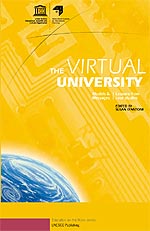
UNESCO’s International Institute for Educational Planning (IIEP) and the OECD’s Centre for Educational Research and Innovation (CERI) are holding an Internet discussion forum to focus on the findings and conclusions from a draft OECD study on Open Educational Resources*, and raise awareness on OER. The Community of Interest that has been formed has been active since October 2005 and has more than 600 members from 94 countries. For more information about the Community and previous discussions, go to http://www.unesco.org/iiep/virtualuniversity/forums.php.
The forum will end on December 1st,2006. The upcoming sessions are organized as follows:
- 20-26 November: What are the motives or incentives and barriers for individuals and institutions to use, produce and share OER?
- 27 November – 1 December: What are the policy implications and the most pressing policy issues at institutional, regional and national level coming out from this study?
To participate in the forum, send an email to Susan D’Antoni with "Join OECD OER forum" in the subject line.
For more information and continuous updates regarding the OECD study, go to http://www.oecd.org/edu/oer.
Saturday, November 18, 2006
UNESCO and Microbiology
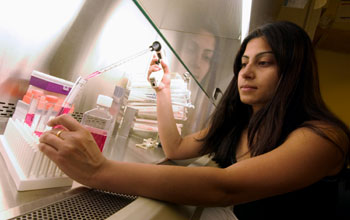 Priyanka Rohatgi is one of the researchers learning how to commandeer the complex machinery that cells use to recognize and respond to such important molecules as steroid hormones, thyroid hormones and vitamin D.
Priyanka Rohatgi is one of the researchers learning how to commandeer the complex machinery that cells use to recognize and respond to such important molecules as steroid hormones, thyroid hormones and vitamin D.Photo from the National Science Foundation
While the general public is largely unaware of the the importance of microbiology, it is a crucially important field of science. Molecular and cell biology is important not only for the understanding of human, animal and plant diseases, but more generally of all living organisms. Microbial processes have important industrial applications, from the food industry to mineral beneficiation to pharmaceuticals. Understanding soil organisms is critical for agriculture, and indeed offers great promise for bio-remediation of damaged environments. While major advances have been made in microbiology, and in microbiological technologies in developed nations, the developing world has lagged seriously.
UNESCO has played an important role in building microbiological capacity to serve developing nations. That role is relatively under-appreciated given the health and economic benefits it will yield in the long run.
UNESCO's Molecular and Cell Biology Network
The major goal of MCBN is to provide opportunities to developing and restructuring countries to attack local and regional problems by utilizing methods of molecular and cell biology. MCBN is a not-for-profit association and a non-governmental organization (NGO) supported by UNESCO. UNESCO's Basic Science program has been working with MCBN for more than a decade.
UNESCO's Microbial Resources Centers (MIRCENs)
The MIRCENs are academic/research institutes in developed and developing countries which network in a global collaborative effort to promote international scientific co-operation on microbiological research and biotechnological applications for the benefit of humankind. Since 1975 and in partnership with the United Nations Environment Program (UNEP), and the United Nations Development Program (UNDP), 34 Microbial Resources Centres (MIRCENS) have been established worldwide.
The Global Microscience Project (GPME)
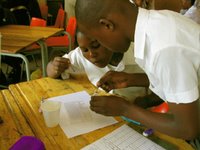
Practical experiences are an essential part of learning science. However, in many countries these experiences are not provided in the majority of their primary and secondary schools. There are several reasons for this: cost, safety, waste disposal and teacher preparation. Indeed, relatively few university students can be trained in science because of these factors. To help overcome these problems, microchemistry and other microscience kits and workbooks have been developed under this UNESCO project.
The project has been in existence for several years, and more than 80 countries have introduced microchemistry workshops and training courses. In some countries, UNESCO-Associated Centers have been established to further develop the microscience project. Now, English versions of the available microscience materials provide coverage of all educational levels: from primary to all of the secondary level (and university/tertiary level in some cases). While the set of teaching and learning packages is only complete in English, many specific microscience materials are available in other languages.
Download Microscience Materials (English Version): Click on the materials to download the different chapters.
I. Primary Microscience Experiences
II. Chemistry
III. Physics (Microelectricity)
IV. Biology
Friday, November 17, 2006
UNESCO's Decentralization Policy

UNESCO's Decentralization Action Plan groups Member States for service by a global network of multi-disciplinary Cluster Offices, National Offices, Regional Bureaus and Liaison Offices. The Bureau of Field Coordination is responsible for ensuring the smooth implementation of this new field network and provides a clear, single line of management. In addition, UNESCO Institutes and centers with well defined mandates and operations exist worldwide.
Click on the subtitle below for linked lists of the relevant offices.
Cluster Offices
These are the main platform for delivery of all UNESCO activities. They are multidisciplinary, ideally with each Sector represented. The Head of Office, while often having a background in a particular field, mostly play executive roles, managing the Program Specialists covering the various domains. The office implements a cluster program which is the result of consultation and consensus; National Offices join that cluster program.
National Offices
National Office programs are more focused, according to their individual purposes. They implement a time-bound national program, which results from consultations within that country. They assist in devising the cluster program where that Member State is concerned.
Regional Bureaus
Each Regional Bureau is responsible for the program in a given region and program domain; the programs are implemented through the Cluster and National Offices and drawn up through regional consultations. Regional Bureaus are almost always located in a Cluster Office and as such benefit from staff in a variety of fields, but often have an additional complement in their own substantive domain. Those staff with regional responsibilities based in offices other than Regional Bureaus act first and foremost as Program Specialists answerable to the Head of their Office. Regional Bureaus have no representational authority, nor do they oversee the Cluster and National Offices in hierarchical terms.
Liaison Offices
Liaison offices in New York and Geneva maintain close relationship with the Headquarters of the United Nations and other United Nations organizations.
Websites of UNESCO Institutes and Centers
There are two UNESCO international Centers and nine Institutes. They are all linked to this website.
Thursday, November 16, 2006
UNESCO Beijing Office: The Science Programs
 Wei Yu, Chair of the Chinese National Commission for UNESCO and Director-General Koïchiro Matsuura
Wei Yu, Chair of the Chinese National Commission for UNESCO and Director-General Koïchiro MatsuuraUNESCO's Beijing Office fosters the advancement, transfer and sharing of scientific knowledge and encourages nations in its cluster to gain a better understanding of the complex relationship between human activities and the environment.
Priority is given to developing human and institutional resources through training, information dissemination, joint research, networking and technology transfer. An area of particular emphasis is the training of young scientists.
From improving lives through the latest engineering advances to protecting people from the floods of the Yangtze River, science holds potential solutions to many pressing problems.
UNESCO's Beijing Office

UNESCO's Beijing Office was created in 1984 as the UNESCO office in China for Science and Technology. The office has gradually expanded its activities and territory since then. In January 2002, it became a Cluster office for East Asia covering the Democratic People's Republic of Korea (DPRK), Japan, Mongolia, the People's Republic of China and the Republic of Korea (ROK). The office serves as the main platform to communicate with UNESCO's Member States in the region.
The Beijing Cluster covers 25% of the world population, consisting of five countries that are interrelated historically and culturally. There are, however, significant cultural and societal differences among the countries. The languages are totally different. Two are highly industrialized countries, two are less developed.
Today, the office serves all five UNESCO programs:
* EducationThe Social and Human Sciences sector unit was created in February 2002. The Communication and Information sector unit was created in September 2004.
* Natural Sciences
* Social and Human Sciences
* Culture
* Communications and Information
World Digital Library Initiative Factsheet

The project for a World Digital Library was proposed by Librarian of Congress James H. Billington in a speech to U.S. National Commission for UNESCO in Washington in June 2005. The project will aim to build upon the experience of the Library of Congress and of other national libraries and cultural institutions around the world to create a large repository of significant primary materials representing cultures from across the globe.
The U.S. Mission to UNESCO has provided this factsheet on its website.
Koïchiro Matsuura opens UNCSTD Meeting in Paris

Read the full discussion on the UNESCO website.
Welcoming the U.N. Commission on Science and Technology for Development to its first meeting at UNESCO Headquarters, the Director-General highlighted the importance of the focus of the Panel’s meeting on the ways to promote “the building of a people-centered, development-oriented and inclusive information society, with a view to enhancing digital opportunities for all people”.
Referring to the lead roles entrusted to UNESCO and CSTD in the follow-up to WSIS, the Director-General explained that the current challenge is to ensure that “the new, more integrated, more holistic vision of the information society” that emerged from WSIS is “acted upon and translated into reality”.The meeting was held in UNESCO headquarters in Paris, November 6-8, 2006.
In the context of the imminent release of the report of the Secretary-General’s High-level Panel on UN System-wide Coherence (HLP), Mr Matsuura felt that a major element in the WSIS follow-up would lie in achieving complementarity of action among the many stakeholders of the information society. “The challenge is to build greater synergy and coherence among agencies, while still drawing on the full range of expertise across the UN”.
Editors Note: I was the first U.S. UNCSTD Commissioner, and am delighted to see the linking of UNCSTD and UNESCO. JAD
Saturday, November 11, 2006
"More power for UN reps urged"
A blue-ribbon reform committee has recommended that the United Nations should establish a network of much more powerful country representatives who have and exercise the authority to rein in and allocate funds for country programs. This would presumably affect UNESCO's programs as well as those of other decentralized U.N. agencies.
The reform committee of 15 including the UK chancellor of the exchequer, the prime ministers of Pakistan, Norway and Mozambique, and the former presidents of Chile and Tanzania.
The committee suggests designing unified UN development plans in each country, putting all funds into a single pot, and then allocating money to the different agencies as appropriate. The process would be overseen by a UN resident-coordinator in that country who would have far more authority than at present. The UN’s global network of coordinators would then report to a powerful new ‘Sustainable Development Board’, headed by the UNDP in New York.
Their proposals need the approval of the General Assembly to become policy.
According to the The Financial Times article, it is far from clear whether the recommendations will be accepted by the General Assembly.
UNESCO-WTA Collaboration

The World Technolopolis Associaiton (WTA) and UNESCO signed a contract earlier this year to collaborate. With this contract, the two organizations will carry out joint projects, including:
1. a Workshop on Science City Development
2. Developing the UNESCO-WTA Center for Science Cities Development
3. Publishing a Book “ Science Cities Development in the World”
In accordance with this agreement, the International Training Workshop on "High Technology Clusters in a Global Context" was held in Daejeon, Republic of Korea, from 6 to 10 November 2006.
WTA is a cooperative organization among world-class science cities that carries out various projects for the development of the WTA member cities as well as other cities worldwide. Members include science and technology oriented local governments, universities, research institutes, businesses, or in some way related organizations and individuals.
Friday, November 10, 2006
UNESCO produced TV documentary on Darfour gets best investigative journalism award

Read the full UNESCO press release.
“The Children of Darfur”, directed by Denmark’s Camilla Nielsson and produced by UNESCO, receives the International TV3 Actual Award today in Barcelona, Spain, a 10,000-euro first prize for outstanding examples of investigative journalism.
UNESCO produced this documentary as part of its “Revisiting Public Service Television” series.
The Children of Darfur had already received this summer the 25th Grand Prix of Documentary at the 2006 Monte-Carlo TV Festival. Other prizes received by the series include the Golden Award from the Aljazeera Documentary Film Festival and the Bronze Medal at the URTI TV Film Festival.
Ethics of Science in Africa
Key areas that will be addressed include:
* ethics education and consultation on the draft core curriculum for bioethics teaching;A Youth Forum on the ethical and social responsibilities of scientists in Africa is also planned, in order to involve young researchers or representatives of youth organizations in the work of COMEST.
* environmental ethics, consultation on the draft policy advice on environmental ethics and the problem of toxic waste in Africa;
* regional consultation on science ethics and scientists' responsibility and setting up monitoring and application bodies;
* and the ethical dimensions of the relation among biodiversity, genetically modified organisms and biotechnology.
Finally, a Regional Ministerial Meeting on the incorporation of ethics of science and technology in African public policies will also take place in order to assure visibility and political support to the debate of this matter in the West Africa region.
"Sixty Years of Science at UNESCO: 1945-2005"

Editorial Committee: Jake Lamar, Brian Smith, Bruno de Padirac and Gail Archibald, UNESCO, 2006, 696 pages. ( €30,00 )
Summary: "The scientific mandate of the United Nations educational, Scientific and Cultural Organization (UNESCO) linked, from the outset, science with people, peace, societal benefits and the environment. In its scientific outreach to all civilizations during the past 60 years, UNESCO has championed the roles of science in development and the fight against poverty. Among others, it has also helped create numerous institutes, publications and non-governmental organizations to bring together the scientific world - sometimes despite cultural and political barriers.
"Sixty Years of Science at UNESCO 1945–2005 offers an inside perspective on the past six decades of this engagement. Including personal reminiscences of former and active staff who contributed to the UNESCO experience, the story is enriched by an historical analysis of the first 20 years of the Organization’s action in science.
"The volume traces through six parts the role played by UNESCO in the history of international science cooperation in an ever-changing world: I. Setting the Scene, 1945–1965; II. Basic Sciences and Engineering; III. Environmental Sciences; IV. Science and Society; V. Overviews and Analyses; and VI. Looking Ahead. It also features a list of chronological milestones set along the way."
Decisions adopted by the Executive Board at its 175th session, Paris, 26 September-12 October 2006
More than 15 States ratify the Convention on the Protection and Promotion of the Diversity of Cultural Expressions
As of 8 November, 16 nations have ratified the Convention on the Protection and Promotion of the Diversity of Cultural Expressions. The Convention was adopted by UNESCO’s General Conference in October 2005. It will enter into force three months after the the 30th nation has ratified. According to Director-General of UNESCO, Koïchiro Matsuura" “No other UNESCO Convention concerning culture has been ratified by so many States in such a short time.”
UNESCO now administers of a range of standard setting instruments in the field of culture including three Conventions – concerning world heritage (1972), intangible heritage (2003), and the diversity of cultural expressions (2005).
The Convention on the Protection and Promotion of the Diversity of Cultural Expressions should be of special interest with respect to the Communications and Information program of UNESCO, since it deals so extensively with the cultural impact of the globalization of the media.
UNESCO/Jikji Memory of the World Prize: Call for nominations

Significant contributions to the preservation and accessibility of documentary heritage are now being sought to be nominated for the second UNESCO/Jikji Memory of the World Prize.
The Prize of US$30 000 was created to commemorate the inscription of the Buljo jikji simche yojeol, the oldest known book of movable metal print in the world, in the Memory of the World Register. The Jikji is the second volume of "Anthology of Great Buddhist Priests' Zen Teachings". It contains the essentials of Zen Buddhism compiled by Baegun, a priest. This book was printed at the old Heungdeok-sa temple in Cheongju city, using movable metal type in July 1377. The book was printed in two volumes: the first volume has yet to be found and the second volume is being kept in the National Library of France. View the Digital Jikji.
The Prize is awarded every two years to individuals or institutions in recognition of their contribution to the preservation and accessibility of documentary heritage as a common heritage of humanity. Funded by the Republic of Korea through arrangements made with the Municipal Council of Cheongju City, this Prize was approved by UNESCO’s Executive Board in April 2004.
Nominations to this second edition of the Prize should be submitted by 31 December 2006. Each nomination must include, in English or French, a description of the candidate’s background and achievements, a summary of the work submitted for consideration and a review of the way in which this work has contributed to the preservation and accessibility of documentary heritage.
Nominations can be submitted to UNESCO by completing the online nomination form.
Wednesday, November 08, 2006
Nobel Committee Broadens Definiton of Peace
Michael Renner, a Senior Researcher at the Worldwatch Institute, comments on the 2006 Nobel Peace Prize award. >>Full article
Alfred Nobel stated that the Prize be given to “the person who shall have done the most or the best work for fraternity between nations, for the abolition or reduction of standing armies and for the holding and promotion of peace congresses ”. Though the Norwegian Nobel Committee’s latest decision is grounded on a more modern principle; that “peace can not be achieved unless large population groups find ways in which to break out of poverty. Micro-credit is one such means. Development from below also serves to advance democracy and human rights.”
The 2006 Peace Prize, -awarded to micro-credit pioneer Muhammad Yunus and the Grameen Bank he founded-, may indeed draw criticism from traditional security analysts.
Working towards a conception of peace that is more than the mere absence of war demands a commitment to sustainable development, equity, and participatory democracy. We need to enhance our comprehension of the ways in which a multitude of social, economic, environmental, and demographic pressures interact, and how these dynamics play out in light of ethnic and political fault lines.
Monday, November 06, 2006
Alice Ilchman; Advisor to Americans for UNESCO
Alice Stone Ilchman was a member of the Advisory Council of Americans for UNESCO, sharing her great knowledge and experience in education and international affairs. She died in August at her Bronxville home from complications of pancreatic cancer. She was 71. We mourn her loss.
Dr. Ilchman was dean at Wellesley College for five years and president of Sarah Lawrence College in Bronxville, N.Y., for 17. She was appointed dean of the college and professor of economics and education at Wellesley in 1973. Dr. Ilchman was instrumental in establishing Wellesley's Center for Research on Women. Her accomplishments while she was at the helm of Sarah Lawrence from 1981 to 1998 were many. Her legacy includes two new buildings, 10 faculty chairs, three overseas programs, and stronger fiscal health.
During her tenure at Sarah Lawrence, Dr. Ilchman received an Honorary Doctorate from Mt. Holyoke College (1982), the Maternity Association Carola Warburg Rothschild Award (1991), the Maxwell "Spirit of Public Service Award" (1994), The Wellesley College Distinguished Service Award (1995), a Fulbright Honor (1996), and the Alice Ilchman Award for Public Service (1998).
She served as assistant secretary of state for educational and cultural affairs during the Carter administration for two years, with responsibility for the newly created United States Information Agency, the Fulbright program, US libraries abroad, and the international visitor program.
For 13 years, she was a member of the board of the Rockefeller Foundation. At the time of her death, she was director of the Jeannette K. Watson Fellows program, which creates paid summer internships for first-generation college students in New York City.
She had a long interest in and association with India. In 1962 and 1963, she and her husband lived in Delhi and Rajasthan, while she worked on her dissertation on rural development in India for the London School of Economics. She lived in Delhi again in 1968 and 1969. While at the University of California at Berkeley, she directed three Peace Corps training projects for India and co-taught the school's first interdisciplinary South Asian studies course.
Dr. Ilchman graduated from Mount Holyoke College in 1957 and was a member of its board of trustees for 10 years. She earned her master's degree from the Maxwell School of Citizenship and Public Affairs at Syracuse University and her doctorate from the London School of Economics and Politics in 1965.
In addition to her husband and son, Dr. Ilchman leaves a daughter, Sarah, of New York City; two sisters, Nancy Dickinson of Indianapolis and Elizabeth Stone of Los Angeles; and a brother, Donald C. Stone Jr. of Oakland, Calif.
Read obituaries from:
* The Boston Globe
* Sarah Lawrence College
* The New York Times
* The Washington Post
Tuesday, October 31, 2006
Knowledge Societies

The world is moving towards knowledge societies. Today, a nation’s wealth depends more on the production, exchange and transformation of knowledge than on natural wealth or industry.
* Towards Knowledge Societies (The First UNESCO World Report)
* "Communication: from information society to knowledge societies" (The UNESCO Courier, Oct. 2003)
* Knowledge Societies and Culture
* Infosheet (PDF Format)
Providing Access to Preventive Commodities at UNESCO Headquarters

While attending the 28th Meeting of the Committee of Cosponsoring Organisations (CCO) of UNAIDS in New York, UNESCO’s Director-General Mr. Koïchiro Matsuura announced his decision to accept a recommendation of UNESCO’s Workplace Committee on HIV and AIDS to install preventive commodity dispensers in the premises of UNESCO Headquarters.
The announcement comes as part of UNESCO’s commitment to strengthen knowledge on HIV and AIDS among all of its employees, ensure staff is familiar with the United Nation’s HIV and AIDS workplace policies, and implement a policy of zero tolerance for stigma and discrimination in the workplace.
The Director-General also reported at the CCO meeting on progress made to date on training staff in order to give them knowledge and skills for responding to HIV and AIDS in their professional and private lives. Since the launch of the campaign to sensitise UNESCO personnel on HIV and AIDS, eleven percent of HQ staff have attended the orientation sessions.
UNESCO has an explicit program against HIV/AIDS.
Comment: Like the search for peace, the battle against this epidemic must begin in the minds of men and women. It is important that members of UNESCO's focus sectors -- education, science, culture and communications -- be sensitized to the magnitude of the problem and their role in its solution. Thus it is important that UNESCO itself begin by sensitizing its own staff. JAD
The World Congress on Communication for Development
Report by the Director-General on the Implementation of the Program and Budget (32 C/5) and on Results Achieved in the Biennium 2004-2005

"This Report on the implementation of the program and budget during the 2004-2005 biennium represents an important milestone in the ongoing reform of the Organization. Firstly, it is the first biennial report after my re-election as Director-General, and I see it as setting a baseline for reporting during my second term. Secondly, the report provides answers to several issues concerning reporting raised by the Executive Board in the last few years."
Results Achieved for the Individual Main Lines of Action (MLA) of the Communication and Information Sector
Results Achieved for the Individual Main Lines of Action (MLA) of the Social and Human Sciences Sector
Results Achieved for the Individual Main Lines of Action (MLA) of the Natural Sciences Sector
People, Biodiversity and Ecology

This website provides information on seven years worth of UNESCO publications on the preservation of biodiversity. Many can be downloaded free of charge from the website, and the others can be purchased in paper editions. For anyone interested in the conservation of biodiversity, this is a wonderful resource! Here are a couple of the publications:
 Download Water from the Amazon.
Download Water from the Amazon. Download The Importance of Sacred Natural Sites for Biodiversity Conservation.
Download The Importance of Sacred Natural Sites for Biodiversity Conservation.* Part 1
* Part 2
People and Plants Handbook - Issue 9
 Suresh Ghimire and amchis at Dolpa sorting medicinal plants (photo: Susanne Schmitt)
Suresh Ghimire and amchis at Dolpa sorting medicinal plants (photo: Susanne Schmitt)People and Plants is a program of capacity-building in ethnobotany applied to conservation and the sustainable use of plant resources. It was created as a partnership between the World Wildlife Fund (WWF) and UNESCO. The People and Plants Handbook was begun in January 1996 to provide a handy source of information on ethnobotany, conservation and development, and to enable ethnobotanists and others in developing.
Read issue number nine of the handbook.
Go to the archives for previous editions of the handbook.
Monday, October 30, 2006
Science Popularization
The Popularization of Science is one among the oldest UNESCO programs. The program seeks to increase public understanding of science. During the last 60 years three tools have been used to popularize science:
1. UNESCO Prizes in science (Currently UNESCO awards eight different prizes in science.)
2. Science Centers and Museums (UNESCO supports Member States efforts to develop science centers and museums, including - in 2003-2004 - technical assistance on science centre development in East Jerusalem, Morocco and Yemen.)
3. Science exhibition (Several international science exhibitions related to building public awareness of science and technology were organized in 2004 and 2005.)

Check out THE INTERNATIONAL EXHIBITION ON ARABIC-ISLAMIC SCIENCE AND TECHNOLOGY.
Sunday, October 29, 2006
WORLD SCIENCE DAY FOR PEACE AND DEVELOPMENT

WORLD SCIENCE DAY FOR PEACE AND DEVELOPMENT is celebrated on 10 November each year. The Day is an occasion to remind the UNESCO's mandate and commitment on science.
The City of Genoa, Italy, will host this year's celebration of the Day in the context of the Science Festival 2006. Several events will also take place at UNESCO Headquarters and in UNESCO's member States. If you're organizing an event you're welcome to report on your activities to Diana Malpede at unesco.org.
Check out the World Academy of Young Scientists website devoted to World Science Day.
Remembering Jack Fobes
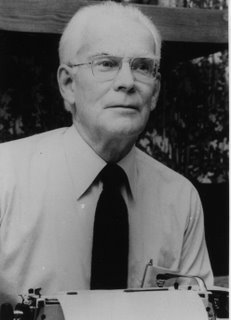
John Edwin Fobes died at his home at the age of 86 on Jan. 20, 2005. A distinguished diplomat, he served as Deputy Director-General of UNESCO from 1971 to 1977 -- the organization's chief operating officer. He served as Chair of the U.S. National Commission for UNESCO on his return from Paris. When the United States withdrew from UNESCO, Jack Fobes immediately founded Americans for the Universality of UNESCO (which subsequently became Americans for UNESCO). From 1985-2002, he headed AUU; through the organization's network and its Newsletter, he virtually single-handedly kept the idea of UNESCO alive in the American mind. In 2002, he assumed the Chair of the Advisory Council of Americans for UNESCO.
We have posted the following the following on the Internet in his honor:
* Remembering Jack Fobes
* Tributes to John Fobes by Koïchiro Matsuura and Paul Schafer
* Jack Fobes: Lien-Link Memorial Articles


